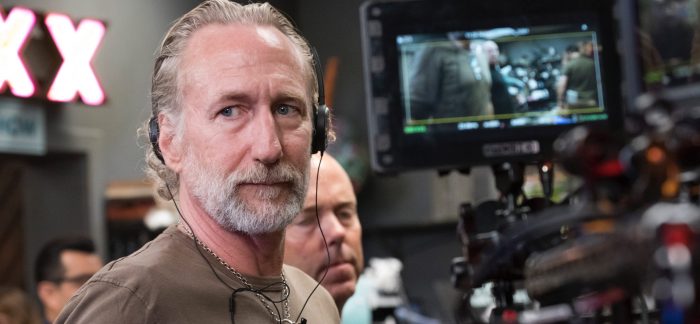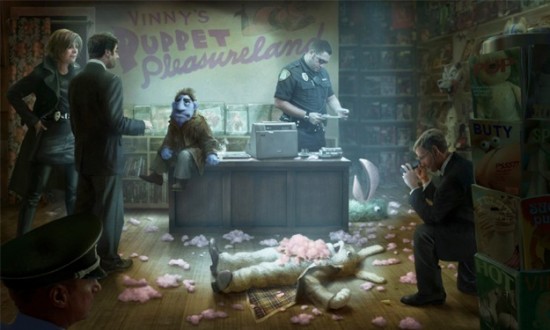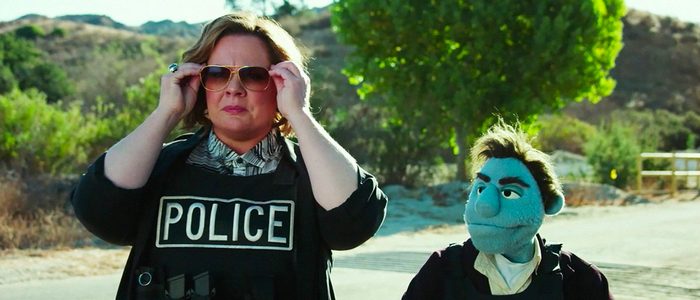‘The Happytime Murders’ Director Brian Henson On Bringing Puppets to R-Rated Territory [Set Visit Interview]
Last October, I traveled to Santa Clarita to visit the set of The Happytime Murders, the new film from Brian Henson. Anyone who knows me knows that I’m a huge Muppets fan, and I’ve been singing the praises of Brian’s “Battleground” episode of Nightmares & Dreamscapes: From the Stories of Stephen King since that premiered over a decade ago. So I am very excited to see what Brian does outside of the studio that Kermit built. And judging from the trailers and what I saw on set, this movie will likely be a big surprise to those who haven’t seen his work at Puppet Up.
During our roundtable interview, Henson discussed the 10-year process of bringing the script to life, creating 40 new puppet characters, going too far with the dirty humor, blending real puppets with CGI puppets, what he learned from his father and the difficulty of puppeteering in a jacuzzi.
So, Brian, maybe just go to the beginning, what was the genesis, the seed of this that got you all excited?
Actually really interesting. It was Todd Berger [who] wrote the very first draft of the script probably 14 years ago or something like that. And he had sent it over to us. And I had read it back then. And it’s quite different now ’cause this is a long, long time later. And I said it’s too R-rated. It’s just not what we do, but I said good luck. And then I started the show Puppet Up. And we started doing improv comedy with puppets. And we do a live show that’s very R-rated, that’s improv comedy. And then I thought this is really good. We found a new voice for puppets. It’s really funny. It’s kind of viciously funny. And it’s a contemporary funny. And I thought, oh this is good. This is a good next place to take Henson-style hand puppetry. As a place to take Henson-style hand puppetry.
So then I thought, well let’s, we should do something scripted, something longform in this tone. And then we remembered this script that we had passed on. And so it came back around and I met with Todd and I said, let’s develop it. It needs a lot of work. But yeah, so that was really the genesis that from Puppet Up I decided, no, I wanna do something that’s R-rated that’s letting the puppeteers rip. And then with Todd…I’ve had the script with Todd for close to 10 years now. And we’ve done many, many drafts. And I couldn’t be happier with where it ended up. You think you’re seeing a shock comedy with puppets where puppets are doing what you never thought they would see, but then it actually is actually a really compelling story. And the characters are really deep and well-developed characters, so it’s sort of a one-two punch. I think people will come in thinking I wanna see puppets doing what I have not seen Henson-style puppets do. But then what they get is actually a really good movie with really good characters.
You said characters and apparently there are about 125 parts.
Oh puppets, yeah.
And 40 of them are brand new that you developed. So what was the mindset of the type of characters that you want to create that we’ve never seen before?
So here’s another interesting…that’s a good question. ‘Cause usually with the Henson Company, we put design continuity into production design and characters. And it’s a very lovely finish. But what we discovered, again with the Puppet Up show, the improv show, which was a live show, which we couldn’t, it’s theater, so we couldn’t afford new puppets. So we pulled out a bunch of old puppets to do that theater show. And then I just started testing it. And saying, well if it does well, we’ll remake puppets and have them all look like they’re from the same family of puppets. And then we realized that having the puppets look like they come from every different type of show you can imagine, but all sort of in the Henson vein. There aren’t suddenly marionettes or Sicilian broad puppets walking around. They’re all in sort of that Henson family. But they deliberately mismatch. You can have a completely abstract bear kind of puppet talking to quite a realistic humanoid puppet, you know. So we’ve actually deliberately mixed it up because what we found was that lent itself to adult humor. And it also lends itself in this movie. This isn’t a designed movie. This happens to be a world that is our world where puppets are alive and they get different jobs and stuff like that. But they are all of these different looks, all sort of jumbled together. So it’s deliberately a wonderfully weird mixture of puppets.
So with this R-rating and the subject matter, anything that you thought maybe as you’re making the movie like okay, that’s too far? Was there anything that didn’t make the cut? Or did kind of everything manage to make it in there?
Well no, some things… And I may have shot stuff that goes over the line, too. I’m not sure. We’ve not been censoring ourselves. We did have a bar scene with a bartender puppet that had a singing penis, which was a very funny joke that we decided not to do. So that one won’t make it in the movie. Yeah, you know what, we probably have gone, we probably have stepped over in a couple of places that I’ll learn as I get it all cut together and then maybe pull it back a little bit. But the idea is it really is uncensored. So it really is, it is quite dirty. But it’s mostly language and implied sexuality. It’s not graphically sexual. It’s puppets [cumming] silly string. But you don’t see their penises. But really there’s some pretty graphic, ridiculous ideas that are in there. But it’s there’s also a little bit of an innocence to the characters and the story, but it’s in a gritty, tough world.
I have to say being Canadian, I talked to Melissa about it, thank you for the maple syrup mention, shout-outs and…
Oh, there’s lots of maple syrup. Well we just decided that we couldn’t think of anything sweeter to us than maple syrup because the idea is she’s a sugar addict. And so the idea is she gets to maple syrup because that’s as far as people will go. But the puppets who are sugar addicts, they go all the way to a level of sugar that doesn’t exist. We imply that there is sugar that is so sweet that only puppets could eat it. If a person ate it, they’d immediately go into sugar shock.
What’s something technically that you guys are pushing puppetry-wise that you’ve never done before?
Well, we’re doing quite a lot of…it’s one of those that I don’t want a big deal, but I, as much as possible we really are performing the puppets. In fact, really we are, we’re always puppeteering everything. Occasionally, the puppets will be CGI, but I’m hoping invisible to the audience. And even when we do that, we real time puppeteer CGI characters, we’re using the CGI sometimes because the puppet needs to do something that we can’t actually do in the set. Or we can’t actually do on location. But even then we want them always puppeteered. So it’s, it allows us to see a little bit more of the puppets and let them, let the audience see them doing more stuff that they’re not used to seeing them do. But hopefully in a way that’s invisible.
Can you explain the CGI puppets?
Oh we’ve been puppeteering CGI for oh 12, 13, probably no, more like 18 years now. And we developed a system a long time ago that is a real-time animation engine. So that we could do animated characters that were being puppeteered. So as we got further and further into that and we do some TV series that way and stuff like that, we realized we could bring it all the way to photo realism. That same technique so that even when it’s CGI, even if a puppet is CGI it’s still actually being, it’s a real time puppeteered CGI character. So the movement should match perfectly. It’s just being done as a technique to get it on film.
Why hasn’t this been done before? Why have we not seen an R-rated puppet movie till now?
From us. You have. Team America is a hard R-rating and it’s marionettes and Meet the Feebles is a hard R-rating. And it’s so we’re not first. This is more like it’s sort of an over in the area of Who Framed Roger Rabbit but with a lot of sort of bad language and stuff like that.
Why did we do it? I feel like we’ve always been a little bit naughty. And the Henson Company is considered a very family friendly brand. At the same time, people go yeah, but they’re cool, they’re a little bit naughty. We’re not Disney. We’re not wholesome. In that sense. We are socially responsible hopefully. And but we’re kind of the cool and weird ones. And so this is us doing that. And I actually am deliberately rating it R because I actually want to make it clear this is for adults. And if you do it PG-13 and just skate the edge and do a PG-13 movie, if I did it, I’d still have an audience full of five-year-olds and that would be a problem. So by making it R rating I’m making it clear it’s for adults.
But one thing that I have to say as a kid and my Dad always loved, all of the puppeteers loved, it was what they could do when the cameras were rolling after the director calls cut and before the director calls action. And actually all of our humor comes out of a very blue place. A very sort of naughty, dirty humor place. That’s where all of our, even the well known Muppets were developed out of that instinct. And then censored to make it… But you know that Kermit has some dirty thoughts and Piggy certainly does. Snd certainly as a kid watching them shoot, you get to see it all come out, but not when the cameras are rolling. And so there’s a lot of fun taking that was my favorite part almost of watching my Dad working was that naughtiness was just so deliciously funny. And everybody, the crew would be laughing so hard. And it’s like wow, can we take this? Can we take that and make it part of entertainment? And the Puppet Up show, the live theater show that we’ve been doing is that. And it works really well with audiences. So the feeling was you know what, I think it really does, so let’s go the whole hog and try a movie.
From when your Dad started to now, have puppets changed like in their essence?
I don’t think puppets will ever change in their essence. Which, I think, is why people say, well isn’t CGI gonna take over puppetry? Isn’t computer animation gonna take over? Maybe. But only in as much as CGI is gonna take over acting and actors and all that. Puppetry is kind of a different, it’s the art of infusing a life… Ah, not anthropomorphic’s not right. Infusing a personality and a life and a sense of background and everything to that water bottle. That’s kind of puppetry. And you could make a hilariously funny movie about this water bottle probably if you thought about it hard enough. Or not maybe movie, but maybe a two minute piece. But puppetry, what it comes from, it’s like when you’re a parent and your kid is throwing a temper tantrum and you go, really? Would you be throwing a temper tantrum? I mean, if it was this water bottle, hey, I wanna throw a temper tantrum. You shouldn’t throw a temper tantrum. That’s not very nice to your family. Yes, it is. No, it’s not. I mean, that’s what we do. We do that for our kids. We do that for everything.
It takes you out of your subjective self and puts you in a more objective place. And puppetry has always done that. And it’s one things that’s great about it is you’re entertaining the child, the innocent and open child inside of all of us, because a puppet comes on screen, you know, you make no preconception. No assumptions about them. You don’t assume anything about their personality or their sexuality or any of that. You wait and you learn like a child does. And that I think is why puppetry has been around so long and it will be forever. Aand that isn’t really so much, so the essence of puppetry I don’t think will ever change. The tools of how you can realize puppetry I think are changing all the time. And like I said, when we do CGI puppetry and what we call digital puppetry, we are delivering a computer-animated product that looks like a computer animated show. But it’s fully puppetry. The approach. So I think in that sense, puppetry sort of evolves, but at the essence of what puppetry is I think it has always been what it is.
Continue Reading The Happytime Murders Set Visit >>
The post ‘The Happytime Murders’ Director Brian Henson On Bringing Puppets to R-Rated Territory [Set Visit Interview] appeared first on /Film.
from /Film https://ift.tt/2usrYcP



No comments: